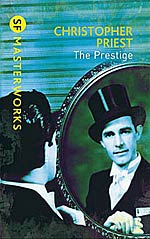
![]() couchtomoon
couchtomoon
12/23/2015
![]()
This is cruel, violent, unexplained, and almost certainly illegal. It has blighted my own life (121).
I have seen [his] new illusion, and it is good. It is devilishly good. It is the better for being simple (194).
I still do not know how [he] works that damnable illusion (205).
I am at a loss for how to review The Prestige. I have started and restarted this review a dozen times, delayed posting it, rewritten it again. It's not that it's difficult to describe: epistolary collage, dueling protagonists, unreliable narrators, metafictional misdirection... all that fun stuff to think about. Stage magic about stage magic, the self-awareness so loud and clear, with bells on. There I go with my highlighter when he talks about intrinsic secrecy and puzzles and the Pact of Acquiescence. I smirk along with him when he splays and rotates his hands while speaking of misdirection. As if I'm on stage with him, as if I'm the volunteer, as if I'm in collusion with the master. As if I won't get fooled.
So I take notes during the setup, mark pages during the performance, and it's possible I've got it all figured out--a dozen different ways, mind you--and then on the last page I'm left blinking and stunned as the curtains go down.
"Wait, what?" That's what I said when it happened. "What!?"
Shame on me. I didn't read carefully enough. Was it I who didn't get it, or me?
So I review, flip around, possibly reread. The best part of the reread, besides oh everything, is that the whole time these dueling magicians spend the book trying to figure out how the other one does it, I spend the whole time figuring out how Priest does IT.
Not only how he does it, but what exactly IT IS.
A perusal of online forums about the 'twist' in The Prestige, besides being mostly unhelpful because they usually focus on the movie, indicates that even the most fervent fans develop a conclusion just short one step from mine. Either that, or they're so in awe of the reveal that they can't even bring themselves to directly state it in a spoiler-laden forum. Because if ______ means ______, and _____ means ______, and he was _____, then that means ______, too.
Right?
It's that last fragment I can't find explicitly stated anywhere.
And this is where I'm stuck. How to share my own conclusion without spoiling it for future readers? For as much as I believe in expiration dates for spoilers--in fact, I prefer spoilers in some cases--The Prestige 'twist' is a different class of spoiler. This ain't no dumb card trick, it is absolutely intrinsic to the experience, so I feel loyal to the magician's code.
But most important are the methods Priest employs to misdirect the audience. On first read, consciousness of my confusion in certain scenes and consciousness of his threat of misdirection never coalesce into an understanding that the latter is causing the former simply because Priest pulls my attention elsewhere, before my alarm bells go off. And once I've reviewed enough of the text to confirm the truth, I realize it's not all that shocking because I've been subconsciously aware of the fallacies the entire time.
It's an incredible piece of story engineering, and impressive, this sixth sense Priest and others like him have about readers and where we focus, what distracts us, and what we notice at the conscious and subconscious levels. As much as I desperately want to shout out my solution to the puzzle, I prefer to let future readers wrestle with his sleight of hand, to allow them to be tricked into acquiescence, to chase after literary questions: How does a writer predict where their audience will be lost? How does an author know which confusions readers won't bother to hunt and hitchhike on? How does a writer know when the reader hasn't possibly had enough Starbucks to get it?
I promise to keep my mouth tightly zipped*... I will go alone to the end (188, 346).
Couch House
17/12/15
12:00 p.m.
0g
*Except for in the comments. You've been warned.
http://couchtomoon.wordpress.com